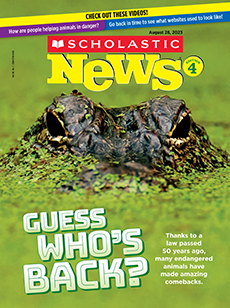Yolanda Renee King never met her grandfather, Dr. Martin Luther King Jr. But the fifth-grader is one of countless activists who have been inspired by his actions. Dr. King spread a message of equality for all people, no matter what their race or color. He helped change the course of history.
Dr. King was a key leader of the civil rights movement of the 1950s and 1960s. Back then, segregation was a way of life in many parts of the U.S., especially in the South. That meant Black people were not allowed to go to the same schools or get treated in the same hospitals as White people. Plus, laws in some states kept many Black people from voting. And a lot of businesses refused to hire Black workers.
Dr. King led peaceful protests to demand equal rights for Black Americans. He gave powerful speeches that led many others to join the cause. Sadly, Dr. King was shot and killed in 1968.
Scholastic News senior editor Karen Kellaher visited Yolanda at her home in Georgia. They talked about her grandfather’s work and how Yolanda is trying to change the world too.
Yolanda Renee King never met her grandfather, Dr. Martin Luther King Jr. But the fifth-grader is one of countless activists who have been inspired by his actions. Dr. King spread a message of equality for all people, no matter what their race or color. He helped change the course of history.
Dr. King was a key leader of the civil rights movement. This was in the 1950s and 1960s. Back then, segregation was a way of life in many parts of the U.S., especially in the South. That meant Black people were not allowed to go to the same schools as White people. They could not be treated in the same hospitals. Plus, laws in some states kept many Black people from voting. Many businesses refused to hire Black workers.
Dr. King led peaceful protests. He demanded equal rights for Black Americans. He gave powerful speeches. His words led many others to join the cause. Sadly, Dr. King was shot and killed in 1968.
Scholastic News senior editor Karen Kellaher visited Yolanda at her home in Georgia. They talked about her grandfather’s work. They also talked about how Yolanda is trying to change the world too.

